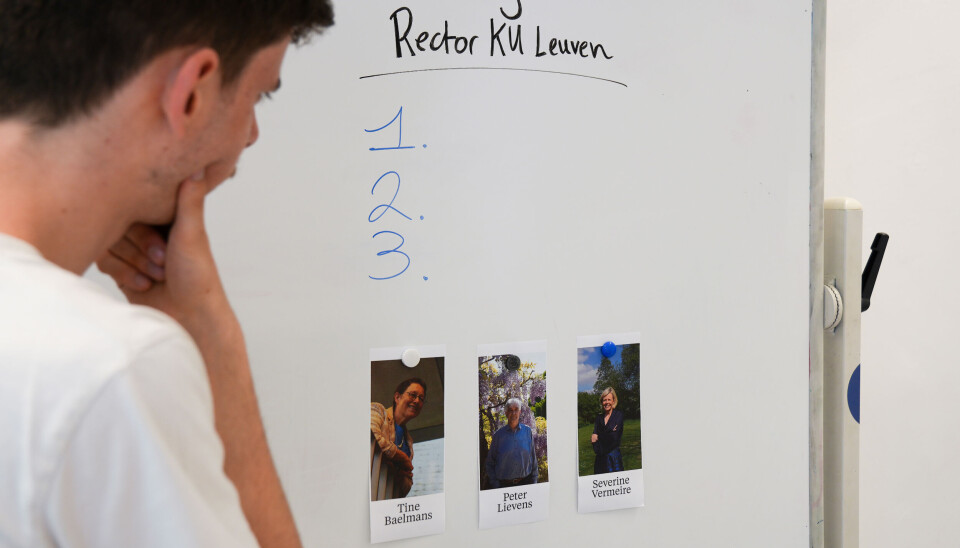EXPLAINER RECTOR ELECTIONS
'Popular candidates receive a bonus': rector elections explained

Until May 6, students can vote for the rector candidates. Veto guides you through the system of electors and faculty blocks: 'It strongly resembles the presidential elections in the United States.'
Until May 6 at 4 p.m., all university students can cast their vote for the rector elections via a link they received in an email from the Student Council. 'KU Leuven is so large that an electronic voting system is the best way to organize the election,' says Professor Stefaan Fiers (KU Leuven), an expert in elections.
Unlike university staff, students don't vote for a single candidate. Instead, they rank all candidates from most to least preferred. In the first round, only the top-ranked candidate on each ballot counts.
Faculty blocks
However, students don't directly vote for a candidate. Similar to the U.S. presidential elections, they elect electors who then represent their vote. This happens on a faculty level: the larger the faculty, the more electors it has. The number of electors per faculty is fixed in advance and is not influenced by how many students actually vote.
'Those who score poorly are eliminated'
An important rule counts: a candidate that receives less than 20% of the vote in a faculty doesn't receive any electors from that faculty. 'This is not impossible in the first round,' says Fiers. 'If one candidate is particularly popular in a faculty, that bonus comes at the expense of the other two candidates, pushing them closer to the 20% threshold.' If the candidate who didn't reach the threshold was your top choice, your vote automatically transfers to your second-ranked candidate. This makes the ranking so influential.
'Those who score poorly are eliminated, but those who are popular thus receive a bonus,' Fiers continues. If a candidate earns more than 60% of the vote in a faculty, they get all of that faculty's electors. This is called a faculty block. The system is comparable to U.S. elections: 'The presidential candidate that wins a state there, obtains all the electors.'
Absolute majority
But Leuven isn't Washington. To win a faculty block, 60% of the vote is required — 50% is not enough. If the candidates receive between 20% and 60% in a faculty, the electors are divided proportionally based on their share of the vote.
If this is not the case, your vote might not be counted toward electors. Just like in the U.S., the winner of the popular vote (the total number of individual votes) doesn't necessarily get the most electors. 'Because of this, voters from large faculties can have a major influence on the final result,' Fiers explains. 'There are past examples where student votes made the difference.'
'No doubt a Political Science student came up with this system'
But the complexity doesn't stop with faculty blocks. To become rector, a candidate must obtain an absolute majority of the overall vote. Professors (Senior Academic Staff) carry the most weight — they account for 70% of the vote. Administrative and Technical Staff on the one hand and Assistant and Special Academic Staff on the other, each account for 10%.
It's not impossible for a candidate to win outright in the first round. 'In theory it can happen, especially since there are only three candidates,' Fiers says. 'Achieving an absolute majority in the first round would be much harder with five or six candidates.'
If no one gets an absolute majority in the first round, the top two candidates proceed to a run-off. 'This also happens in the French presidential elections,' Fiers continues. 'That way, the winner always has majority support.'
Every vote counts
In the second round, the original rankings are used again during which students don't need to vote again, unlike university staff. Their original ballot is reviewed: if your top choice has been eliminated, your vote automatically goes to your next-highest ranked remaining candidate. If your favourite is still in the running, your vote stays with them.
'That's why the order is so important,' says Fiers. 'This way, an absolute majority can be formed without needing a second round of voting. It's a variation of the alternative vote system used in Australia. A lot of thought went into this. No doubt a Political Science student came up with it.' (laughs)
The voting process is complex, but Fiers urges all students to participate. 'Real elections with a ballot box are always more fun, but don't be put off by the email system. These elections are about the future of the university — even if you've only been here for a year. It's an important moment, so make your voice heard.'
This article was translated by use of AI and afterwards revised by our own editorial staff.









